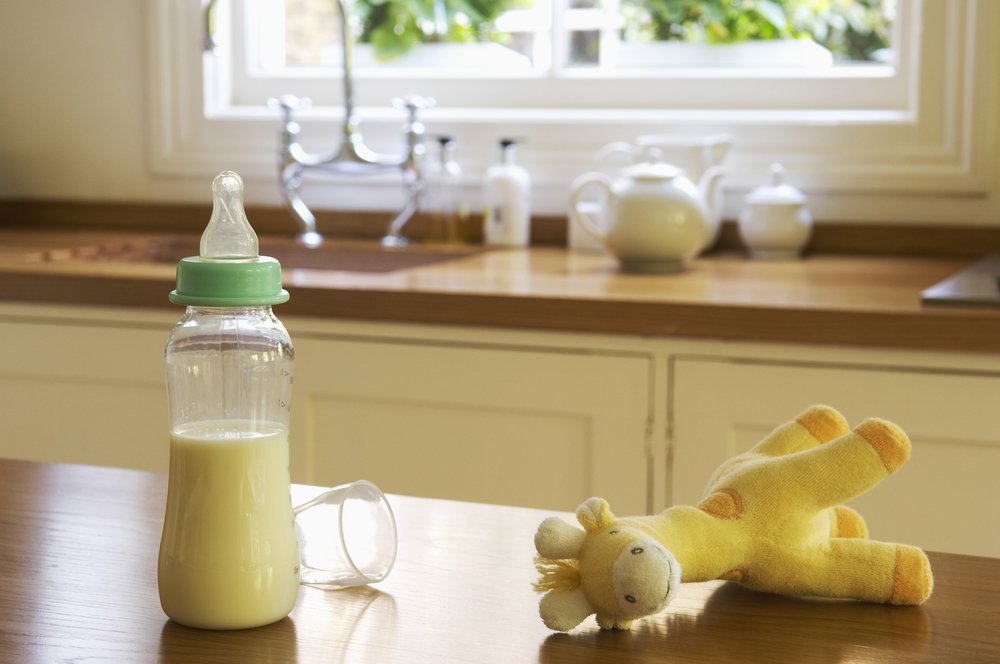What should you do if your baby doesn’t finish their bottle right away? Do you have to toss the breast milk or formula? From day one, breast milk or formula helps your little one start to develop their immune system, and the process continues until they are one year old. That’s why it is important to know the precautions for baby formula storage and the recommendations of how to prepare and sterilize your baby’s bottles.
Baby formula storage
According to the CDC, formula needs to be consumed within 2 hours after mixing it, or within 1 hour from when your baby begins drinking from the bottle. The combination of saliva and formula can favor bacteria production, so it’s best to use it during this window of time or throw out the formula that your baby did not finish.
Also, your child should not continuously drink their bottle for more than 30 minutes to avoid exerting too much energy while eating. Most of the time, this means that if your baby does not finish a formula bottle when feeding them, the leftover formula should be thrown away and a new bottle should be made for the next feeding.
If you won’t use the prepared formula within the first two hours, you should refrigerate it immediately. The refrigerator needs to be at a maximum temperature of 5 °C (41 °F) to prevent or delay bacterial growth. We also recommend putting the bottle under cold water before storing it. As the last recommendation, the mixed formula that is immediately stored in the refrigerator is good for 24 hours.
If you correctly stored it and the recommended time hasn’t passed, you don’t need to reheat the milk or formula before feeding your little one. However, if you decide to do it, warm the bottle under warm running water. You shouldn’t use the microwave since it heats the food unevenly and your baby might burn their mouth or throat because of this. Once you heat the bottle, check the temperature putting some drops on the back of your hand.
Are the guidelines different if you’re offering breast milk in a bottle?
According to the CDC, after your baby starts feeding, breastmilk must be consumed within 2 hours. After this, the milk should be thrown away. Again, bottle feeds should not last longer than 30 minutes. To avoid wasting breast milk, you can offer small amounts in the bottle and add more as needed. Other breast milk guidelines from the CDC include:
- Freshly pumped breast milk is safe at room temperature for up to 4 hours, in the refrigerator for up to 4 days, in a typical freezer for 6 months, and in a deep freezer for 12 months.
- Thawed, previously frozen breast milk is safe at room temperature for 1-2 hours and in the refrigerator for up to 24 hours. Never refreeze previously frozen breast milk.
Recommendations for preparing a bottle
Bottles should be thoroughly washed before every feeding. You can wash them in the dishwasher (if your bottles are dishwasher safe) or by hand. Appropriate sterilization is vital to avoid the risk of microbial contamination and the early spoiling of breast milk or formula. For example, you can sterilize your bottles by placing the bottle pieces in a pot of boiling water for 5-10 minutes.
Also, it’s very important to clean the area where you prepare your baby’s bottle. Clean and disinfect all surfaces that touch the bottle and other products that are going to be in contact with your baby. Always wash your hands with soap and water before preparing anything your little one will ingest.
It’s important to follow the recommendations for proper baby formula storage and preservation. That way, you’ll avoid any risk of consuming spoiled food, but, most importantly, you’ll strengthen your baby’s immune system.







